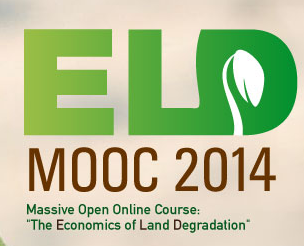The Economics of Land Degradation (ELD) Initiative has published a step-by-step guide to ecosystem service valuation based on a Massive Open Online Course (MOOC) held from 2 March to 17 May 2014, and on the ELD's Interim Report.
Titled ‘Practitioner's Guide: The Economics of Land Degradation,' the publication seeks to support practitioners and decision-makers in making an economic case for sustainable land management.
 17 September 2014: The Economics of Land Degradation (ELD) Initiative has published a step-by-step guide to ecosystem service valuation based on a Massive Open Online Course (MOOC) held from 2 March to 17 May 2014, and on the ELD’s Interim Report. Titled ‘Practitioner’s Guide: The Economics of Land Degradation,’ the publication seeks to support practitioners and decision-makers in making an economic case for sustainable land management (SLM).
17 September 2014: The Economics of Land Degradation (ELD) Initiative has published a step-by-step guide to ecosystem service valuation based on a Massive Open Online Course (MOOC) held from 2 March to 17 May 2014, and on the ELD’s Interim Report. Titled ‘Practitioner’s Guide: The Economics of Land Degradation,’ the publication seeks to support practitioners and decision-makers in making an economic case for sustainable land management (SLM).
Noting that 10-20% of global drylands are currently facing degradation, and 24% of usable land is degraded, the guide calls for a reconsideration of common land use practices. It explains that one way to address the threat of degradation is to empower practitioners globally to calculate the true economic value of land, which will support informed economic decision making and improve the livelihoods of people. Taking a society-centered perspective, the guide seeks to answer two questions: “What is the value of land, not only for landowners and immediate stakeholders, but for society as a whole?; and How can this economic value be estimated?”
The guide follows the “6+1 steps” approach, adopted by the ELD Initiative for an economic cost-benefit analysis of actions, and which consists of: inception; geographical characteristics; types of ecosystem services; role of ecosystem services; land degradation patterns and pressure; cost-benefit analysis and decision-making; and action.
It explains and provides examples based on texts written by MOOC participants on relevant aspects of land valuation, including: scenario-building; terminology relating to ecosystem benefits; environmental valuation methods; sample design; data analysis; and result summaries. The guide also presents elements that must be considered in order to convert an economic case into action, such as a communications strategy.
The ELD guide was published with support of ELD Initiative partner organizations, and Deutsche Gesellschaft für Internationale Zusammenarbeit (GIZ) on behalf of the German Federal Ministry for Economic Cooperation and Development (BMZ). [Publication: Practitioner’s Guide: The Economics of Land Degradation] [Publication Webpage] [ELD MOOC 2014 Website] [ELD MOOC Videos on Youtube] [IISD Land Policy & Practice article on MOOC]